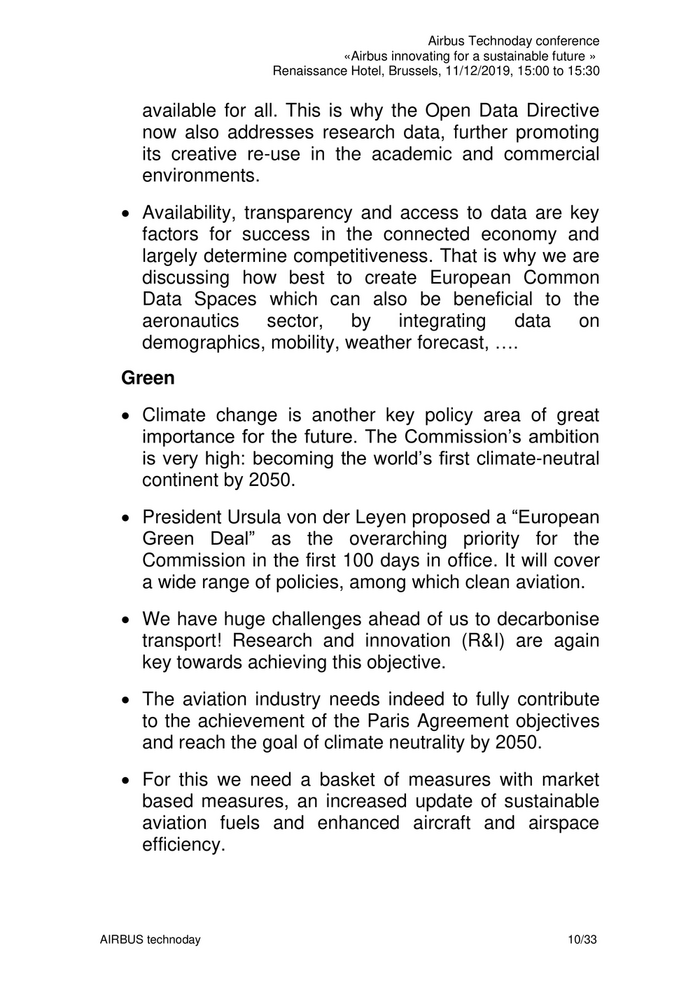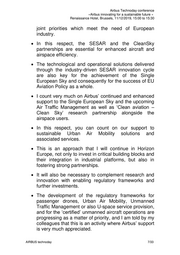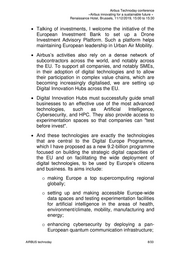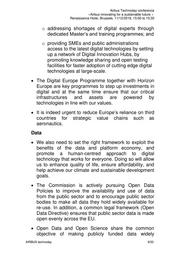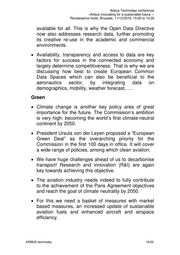19_1336CabinetGabriel-speechAirbustechnoday_Redacted
Dieses Dokument ist Teil der Anfrage „meetings Airbus group since 2017“
Ref. Ares(2022)3471212 Airbus Technoday conference- 05/05/2022 «Airbus innovating for a sustainable future » Renaissance Hotel, Brussels, 11/12/2019, 15:00 to 15:30 GABRIEL/1336 – speech at AIRBUS technoday Scene setter AIRBUS invited you as the future Commissioner for Innovation to give a welcome speech at their technoday conference, titled “Airbus innovating for a sustainable future”. This is followed by an intervention of AIRBUS , and another one by the , member of the executive board. You will also have a bilateral exchange with , subject of briefing GABRIEL/1335. Airbus expects your keynote speech to outline that aeronautics is a strategic sector for Europe’s technology base, jobs and growth. Commercial aeronautics through the dual use technology is a key contributor to the EU’s strategic autonomy: • Innovation will be a key enabler of the green deal • An ambitious budget for Horizon Europe is needed. Non EU competitors are heavily supported and the European industry needs some level playing field. • Long-term research partnerships – especially Clean Aviation and Integrated Air Traffic Management (ATM) - are the most efficient vehicles to address the technology challenges in the next decades since they align the EU institutions, the whole European value chains and research institutes along key objectives. All together we can make a significant change on sustainable aviation through a long term effort. • Airbus has been at the core of the EU research eco-system and the EU industrial success for the past decades, thanks to the vision and courage of the decision makers of the 60s and 70s. Aviation is going through a new revolution, up to us to pave the way for the future of sustainable aviation. • Digital can help sustainability on aviation : digital manufacturing, predictive maintenance, digital European sky. A significant digital contribution has been added in line with CAB instructions (data, platforms, digital manufacturing, …). Given the broad scope, several General Directorates were asked to contribute, with positive replies from GROW (both space and defense) and MOVE. A late RTD contribution has been incorporated after deadline. The aviation context Aviation is responsible for more than 2% of the CO2 emissions and more than 3% of the greenhouse gases human-made globally. While air traffic increases 4.5% per year, aviation emissions increase more than 3% per year. This is not consistent with the agreed international objectives of the Paris Agreement. The path to climate neutrality in 2050 is not obvious in aviation. Solutions elsewhere – such as new fuels, fuel cells and batteries – cannot be directly transferred. In order to AIRBUS technoday 1/33

Airbus Technoday conference «Airbus innovating for a sustainable future » Renaissance Hotel, Brussels, 11/12/2019, 15:00 to 15:30 ensure safety and efficiency, any potential solution requires in-depth research, tests and certification before adoption in aviation. In order to improve environmental performance, research and innovation should: e Accelerate development and deployment of more efficient aeronautics technologies in existing aircraft configurations. « Start ambitious projects to mature and adopt disruptive technologies — e.Q. electrification, digitalisation — and advanced aircraft configurations. No single country or company in Europe has the financial, technological and human resources to put aviation on the path to climate neutrality. Airbus leads the public-private partnership CleanSky2 together with other EU aeronautical industries (with EUR 1.755 billion from Horizon 2020). It builds upon its predecessor CleanSky, started in 2008 (with EUR 800 million from FP7). Most CleanSky/2 research results have not been taken up in aircraft development yet, so their actual environmental impact is limited. (Les Echos, 17/09/2019) Horizon Europe envisages a potential Clean Aviation Partnership for boosting the environmental performance of aviation while ensuring safety. An impact assessment is on-going. In reply to the impact assessment public consultation, Airbus has confirmed preference to focus more on the development and effective deployment of technology and to use synergies with other programmes. AIRBUS technoday 2/33

Airbus Technoday conference «Airbus innovating for a sustainable future » Renaissance Hotel, Brussels, 11/12/2019, 15:00 to 15:30 Line to take • Highlight the opportunities of digital innovations and digitalisation for Europe and your achievements in steering the Digital Single Market, Digitising European Industry and Data Economy Initiatives, with strong impacts on the development of next-generation aeronautics, such as passenger drones. • Underline your support to strong research partnerships in the aeronautics sector. • Emphasise the importance to support SMEs in their digitisation across strategic value chains. In this respect, promote the proposed Digital Europe Programme to support digital capacity building and digital innovation hubs across the EU, to help SME to participate in such digitalised value chains. • Solicit the aeronautics sector to reflect on digital industrial platforms to provide a business-to-business competitive edge in supply chains and customer relations. • Highlight the challenges of “greening” transport, and how space and the European Defence Fund can build synergies with Horizon Europe under your leadership. • Welcome the commitment, steering and vision of Airbus, notably on air taxis and urban air mobility, as well as the commitment for a Clean Aviation Partnership towards climate neutrality in 2050 with tangible outputs taken up in Airbus products. • Underline your support to strong research partnerships in the aeronautics & space sectors, which is already an indication by the Commission to the importance of the sector and the willingness to prioritise investments. • Underline your expectations for such a Partnership to be much more ambitious and impactful than its predecessors and to engage more disruptive technologies and actors from other sectors, as well to increase the level of commitments and contributions from partners, and clearly demonstrate how the partnerships will deliver on our Union priorities, in particular the Green Deal. AIRBUS technoday 3/33

Airbus Technoday conference «Airbus innovating for a sustainable future » Renaissance Hotel, Brussels, 11/12/2019, 15:00 to 15:30 Speech (2427 words for 10 minutes) [Welcome] • Good afternoon, Ladies and Gentlemen. • Thank you for inviting me to your technoday conference and discuss the importance of the aeronautic sector in the European economy. [Innovations & Digitalization of the Aeronautic Sector] • We are proud of Airbus, which has become a global player and is thriving in such a competitive sector as aeronautics. • I would like to talk about the importance of innovation for the success of companies and notably in digital, my st portfolio until the 1 of this month. • It is clear that the disruptive nature of digital transformation presents the European industry with the challenge of staying in the driver's seat. • Digital technologies and in particular artificial intelligence (AI) are changing the world at an unprecedented pace. They are changing the way we communicate, live and work – they also change the way we build our environment. • Digitalisation is the major factor to improve productivity and economic growth. But also, those who control digital technologies are increasingly able to influence economic, societal and political outcomes. • A key ambition for this new Commission will be to make Europe fit for the digital age. • Digital transformation is one of the biggest challenges for policy makers, for the economy and citizens. It is one of the key policy priorities outlined by President AIRBUS technoday 4/33

Airbus Technoday conference «Airbus innovating for a sustainable future » Renaissance Hotel, Brussels, 11/12/2019, 15:00 to 15:30 Von der Leyen. This is also true of a green deal, to which I come back in a moment. • This is also why, as the Commissioner for Innovation, I will work with Margrethe Vestager, Executive Vice- President in charge of the digital portfolio, to “ensure that Europe fully grasps the potential of the digital age and strengthens its industry and innovation capacity” as a key part of strengthening Europe’s technological leadership and sovereignty. • A lot has already been achieved over the last five years to address the challenges and opportunities of the digital transformation. In the context of the European Commission’s Digital Single Market Strategy, we have adopted important policies and legal proposals, for example on free flow of data, roaming, or to update the copyright regime. • Industry faces challenges in the adoption of new technologies, including lack of courage, lack of clear business cases, lack of coordination among organisational departments, and lack of necessary talents, e.g. data scientists. • A transformative digitalisation of all sectors of the economy is needed for the EU to reinforce its competitiveness, build a strong industrial base and manage the transition to a smart economy. Studies show that Industry 4.0 could have an estimated value- creation potential for manufacturers and suppliers of $3.7 trillion in 2025. • The EU has launched the Digitising European Industry initiative in 2016. It aims to reinforce the EU’s competitiveness in digital technologies and to ensure that every industry in Europe, in whichever sector, wherever situated, and no matter of what size can fully benefit from digital innovations. AIRBUS technoday 5/33

Airbus Technoday conference «Airbus innovating for a sustainable future » Renaissance Hotel, Brussels, 11/12/2019, 15:00 to 15:30 • The initiative had the ambitious goal to mobilise 50 billion public and private investments by 2020 on a strategy of digital research and innovation. Recent review show that the levels of investments are being reached and meet the challenges at stake. • This has been achieved thanks to the strengthening of research and innovation in digital technologies, such as AI, HPC, 5G and cybersecurity. • Going to market with a good or a service today requires that companies identify and assemble several technology building blocks. For example, autonomous flying will need vision systems, robotics components, AI, mobile connectivity and many more. • Would it be not more efficient and easier for European developers and integrators if these building blocks would already be validated and pre-assembled to address challenges of specific sectors? • We retained, and financed though calls in Horizon Europe worth 1 billion EUR from 2018 to 2020, the raise of Digital industrial platforms as an answer to accelerate the creation and development of systems integrating all these technologies. • Development of the next generation digital industrial platforms and the acceleration of producing norms and standards have to build on the strengths and assets of key industrial value chains, and support keeping value creation in the EU. • When comparing to the significant volumes of investments in other regions of the world, it is more than ever critical to build strong European partnerships to not only mobilise a critical mass of additional public and private investments but also to work together on AIRBUS technoday 6/33

Airbus Technoday conference «Airbus innovating for a sustainable future » Renaissance Hotel, Brussels, 11/12/2019, 15:00 to 15:30 joint priorities which meet the need of European industry. • In this respect, the SESAR and the CleanSky partnerships are essential for enhanced aircraft and airspace efficiency. • The technological and operational solutions delivered through the industry-driven SESAR innovation cycle are also key for the achievement of the Single European Sky and consequently for the success of EU Aviation Policy as a whole. • I count very much on Airbus’ continued and enhanced support to the Single European Sky and the upcoming Air Traffic Management as well as ‘Clean aviation – Clean Sky’ research partnership alongside the airspace users. • In this respect, you can count on our support to sustainable Urban Air Mobility solutions and associated services. • This is an approach that I will continue in Horizon Europe, not only to invest in critical building blocks and their integration in industrial platforms, but also in fostering strong partnerships. • It will also be necessary to complement research and innovation with enabling regulatory frameworks and further investments. • The development of the regulatory frameworks for passenger drones, Urban Air Mobility, Unmanned Traffic Management or also U-space service provision, and for the ‘certified’ unmanned aircraft operations are progressing as a matter of priority, and I am told by my colleagues that this is an activity where Airbus’ support is very much appreciated. AIRBUS technoday 7/33

Airbus Technoday conference «Airbus innovating for a sustainable future » Renaissance Hotel, Brussels, 11/12/2019, 15:00 to 15:30 • Talking of investments, I welcome the initiative of the European Investment Bank to set up a Drone Investment Advisory Platform. Such a platform helps maintaining European leadership in Urban Air Mobility. • Airbus’s activities also rely on a dense network of subcontractors across the world, and notably across the EU. To support all companies, and notably SMEs, in their adoption of digital technologies and to allow their participation in complex value chains, which are becoming increasingly digitalised, we are setting up Digital Innovation Hubs across the EU. • Digital Innovation Hubs must successfully guide small businesses to an effective use of the most advanced technologies, such as Artificial Intelligence, Cybersecurity, and HPC. They also provide access to experimentation spaces so that companies can "test before invest". • And these technologies are exactly the technologies that are central to the Digital Europe Programme, which I have proposed as a new 9.2-billion programme focused on building the strategic digital capacities of the EU and on facilitating the wide deployment of digital technologies, to be used by Europe’s citizens and business. Its aims include: o making Europe a top supercomputing regional globally; o setting up and making accessible Europe-wide data spaces and testing experimentation facilities for artificial intelligence in the areas of health, environment/climate, mobility, manufacturing and energy; o enhancing cybersecurity by deploying a pan- European quantum communication infrastructure; AIRBUS technoday 8/33
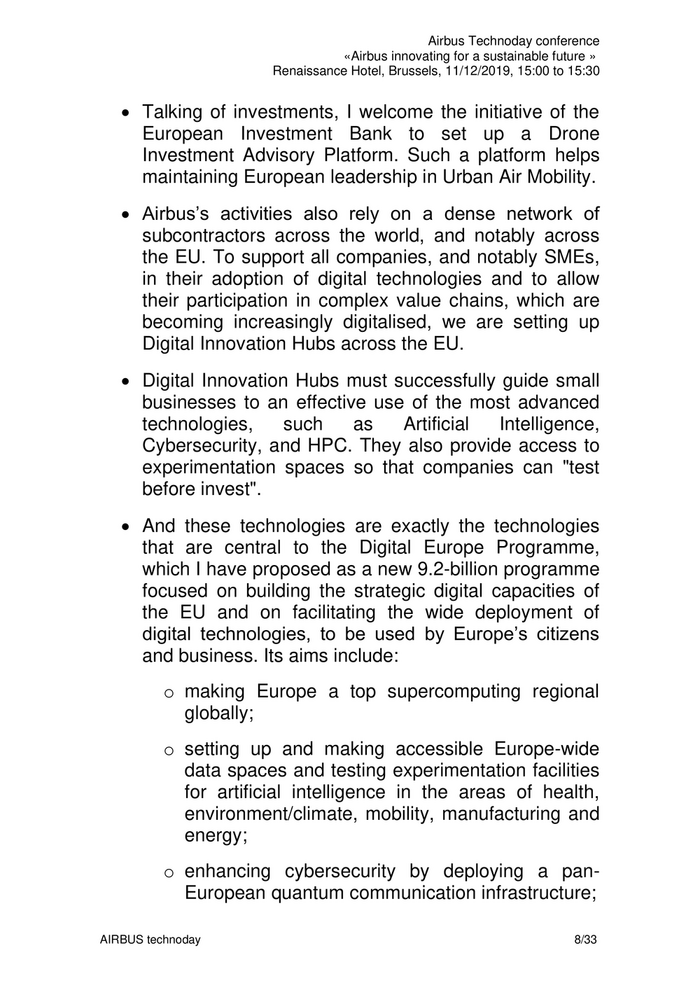
Airbus Technoday conference «Airbus innovating for a sustainable future » Renaissance Hotel, Brussels, 11/12/2019, 15:00 to 15:30 o addressing shortages of digital experts through dedicated Master’s and training programmes; and o providing SMEs and public administrations access to the latest digital technologies by setting up a network of Digital Innovation Hubs, by promoting knowledge sharing and open testing facilities for faster adoption of cutting edge digital technologies at large-scale. • The Digital Europe Programme together with Horizon Europe are key programmes to step up investments in digital and at the same time ensure that our critical infrastructures and assets are powered by technologies in line with our values. • It is indeed urgent to reduce Europe’s reliance on third countries for strategic value chains such as aeronautics. Data • We also need to set the right framework to exploit the benefits of the data and platform economy, and promote a human-centred approach to digital technology that works for everyone. Doing so will allow us to enhance quality of life, ensure affordability, and help achieve our climate and sustainable development goals. • The Commission is actively pursuing Open Data Policies to improve the availability and use of data from the public sector and to encourage public sector bodies to make all data they hold widely available for re-use. In addition, a common legal framework (Open Data Directive) ensures that public sector data is made open evenly across the EU. • Open Data and Open Science share the common objective of making publicly funded data widely AIRBUS technoday 9/33
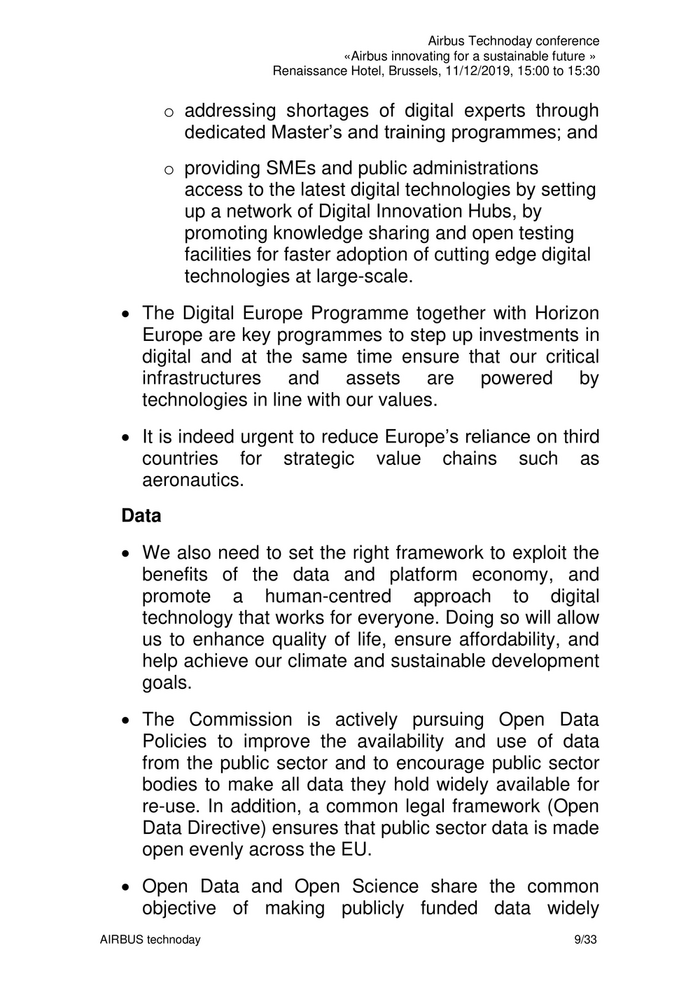
Airbus Technoday conference «Airbus innovating for a sustainable future » Renaissance Hotel, Brussels, 11/12/2019, 15:00 to 15:30 available for all. This is why the Open Data Directive now also addresses research data, further promoting its creative re-use in the academic and commercial environments. • Availability, transparency and access to data are key factors for success in the connected economy and largely determine competitiveness. That is why we are discussing how best to create European Common Data Spaces which can also be beneficial to the aeronautics sector, by integrating data on demographics, mobility, weather forecast, …. Green • Climate change is another key policy area of great importance for the future. The Commission’s ambition is very high: becoming the world’s first climate-neutral continent by 2050. • President Ursula von der Leyen proposed a “European Green Deal” as the overarching priority for the Commission in the first 100 days in office. It will cover a wide range of policies, among which clean aviation. • We have huge challenges ahead of us to decarbonise transport! Research and innovation (R&I) are again key towards achieving this objective. • The aviation industry needs indeed to fully contribute to the achievement of the Paris Agreement objectives and reach the goal of climate neutrality by 2050. • For this we need a basket of measures with market based measures, an increased update of sustainable aviation fuels and enhanced aircraft and airspace efficiency. AIRBUS technoday 10/33
